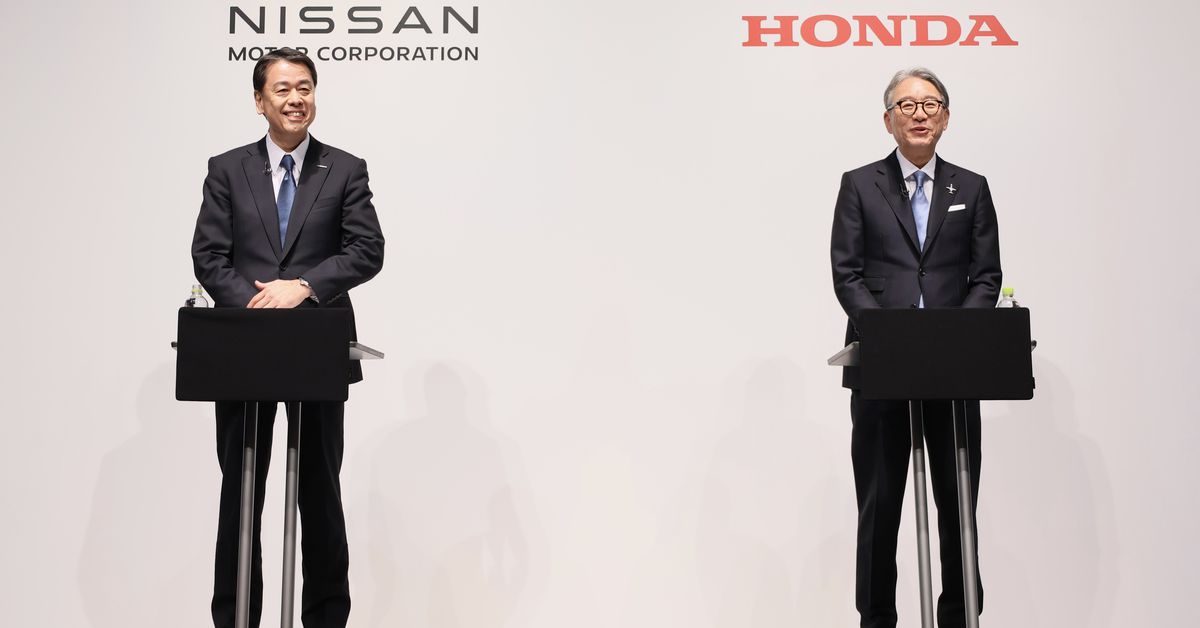Japanese automakers Honda and Nissan are reportedly in talks to merge their operations in an effort to better compete with electric vehicle (EV) manufacturers such as Tesla, BYD, and others. According to a recent report by Nikkei Asia, the two companies have discussed signing a memorandum of understanding that outlines plans to split equity into a new holding company from which both will operate.
Background on the Potential Merger
The idea of Honda and Nissan merging their operations is not entirely new. The two companies have been working together in various capacities for some time, including collaborating on EV technology and software development. In fact, they had even invited Mitsubishi to join them in this endeavor.
However, the current state of affairs suggests that a merger may be more than just a possibility. Nissan, in particular, is facing significant financial struggles. According to Reuters, Nissan’s net earnings in the middle of 2024 were down by over 90% year-over-year, and it had to cut its annual operating profit forecast by nearly 70%.
Nissan’s Financial Struggles
Nissan’s financial woes are well-documented. The company has been struggling to compete with EV manufacturers such as Tesla and BYD, which have gained significant market share in recent years. In fact, according to Bloomberg, Japanese automakers are losing big market share in east and southeast Asia from China to Indonesia.
In an effort to stay afloat, Nissan is relying on Honda to potentially come to its rescue. If Honda were to acquire a majority stake in Nissan, it would likely be able to provide the necessary financial support to help the company recover from its current difficulties.
Honda’s Plans for the Future
While the potential merger between Honda and Nissan has been making headlines, Honda is also preparing to launch its new Honda Zero EV platform next year. This move is seen as a significant step towards the company’s goal of becoming a leading player in the EV market.
In addition to its plans for electric vehicles, Honda is also finding success with its GM-based electric Prologue SUV in the US market. The company has stated that it will launch a new hybrid model next year, which is expected to be a significant contributor to its sales growth.
Nissan’s Plans for the Future
Nissan, on the other hand, has been struggling to keep up with the competition. Despite releasing one of the first mass-market EVs, the Leaf in 2011, the company has failed to replicate this success with subsequent models.
In an effort to turn things around, Nissan announced that it would have 16 "electrified" models by 2026. However, many industry analysts have expressed skepticism about the company’s ability to meet this goal.
Why a Merger Between Honda and Nissan Makes Sense
A merger between Honda and Nissan makes sense for several reasons. Firstly, both companies are facing significant financial challenges in the current market environment. By combining their operations, they would be able to share resources and reduce costs, making them more competitive in the long run.
Secondly, a merger would allow the two companies to pool their expertise and technological capabilities, creating a more formidable competitor in the EV market. This is particularly important given the growing importance of electric vehicles in the global automotive industry.
Potential Benefits of a Merger
A potential merger between Honda and Nissan could have several benefits for both companies and the broader automotive industry. Some of these benefits include:
- Increased competitiveness: By combining their resources, the two companies would be able to better compete with EV manufacturers such as Tesla and BYD.
- Improved financial performance: A merger would allow the two companies to share costs and reduce debt, making them more financially stable in the long run.
- Enhanced technological capabilities: The combined entity would have a more comprehensive portfolio of technologies and expertise, making it better equipped to meet the needs of the market.
Conclusion
The potential merger between Honda and Nissan is a significant development in the global automotive industry. While there are many uncertainties surrounding this proposal, one thing is clear: both companies face significant financial challenges that require immediate attention.
By combining their operations, Honda and Nissan may be able to create a more competitive entity that is better equipped to succeed in the EV market. However, only time will tell if this merger will ultimately come to fruition.
Frequently Asked Questions
-
What are the main reasons why Honda and Nissan are considering a merger?
The two companies are facing significant financial challenges in the current market environment, and they believe that a merger would allow them to better compete with EV manufacturers such as Tesla and BYD.
-
How would a merger between Honda and Nissan affect their operations and employees?
A merger would likely involve significant changes to both companies’ operations, including the potential for job losses or restructuring. However, it’s also possible that some employees could be retained or even benefit from the merger.
-
What are the main benefits of a potential merger between Honda and Nissan?
The combined entity would have increased competitiveness, improved financial performance, and enhanced technological capabilities, making them better equipped to succeed in the EV market.
